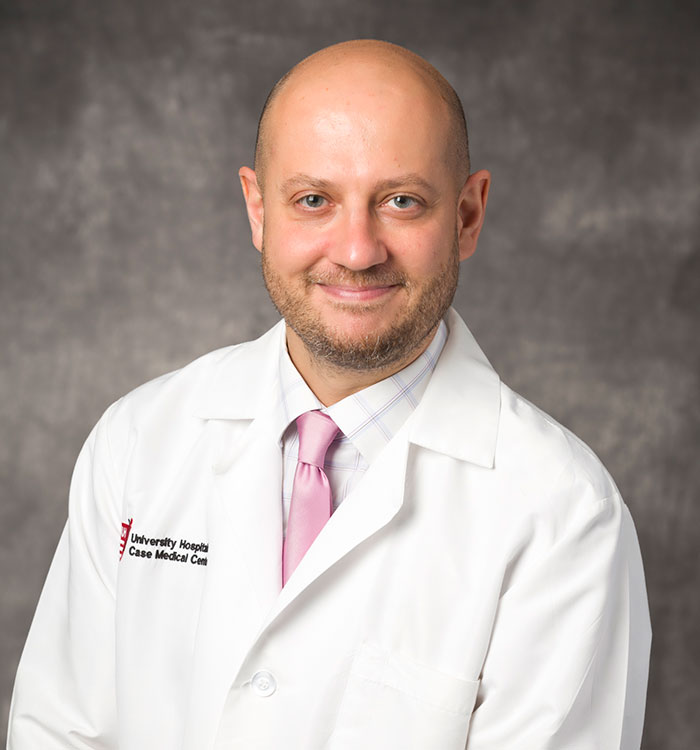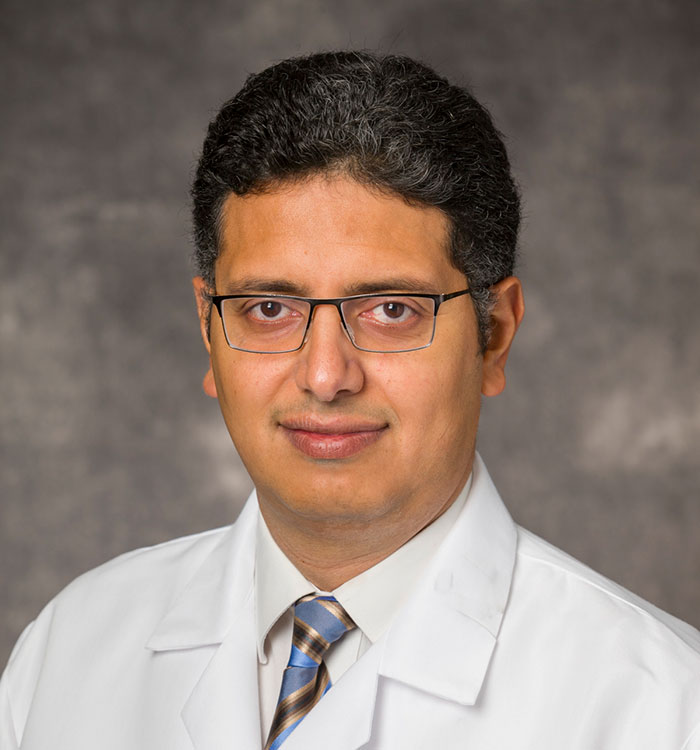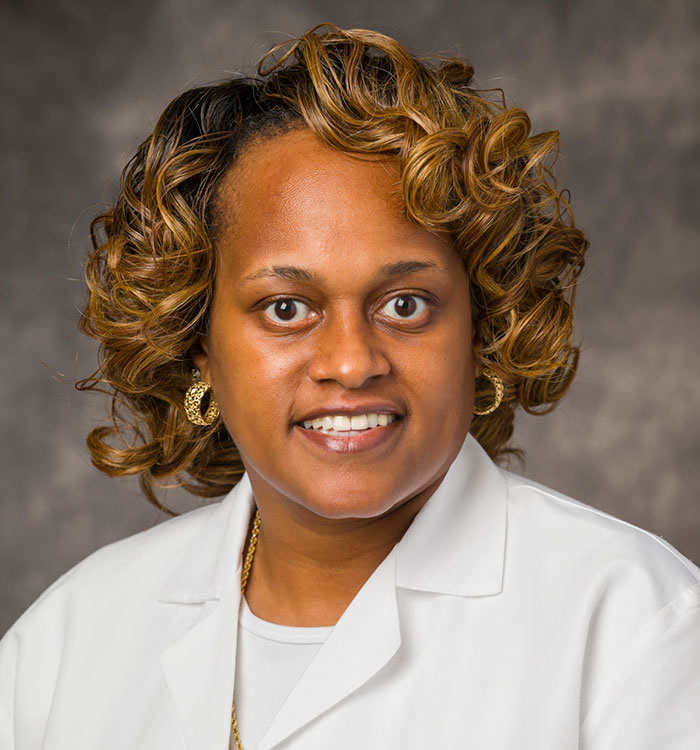In the Spotlight: UH Multiple Sclerosis and Neuroimmunology Program
January 14, 2021
Multidisciplinary program focuses on personalized treatment to improve patients’ quality of life, manage symptoms
Innovations in Neurology & Neurosurgery | Winter 2021
Multiple sclerosis (MS) treatment has changed dramatically over the past 20 years. Healthcare providers now have 22 FDA-approved medications, compared to two in the 1990s, as well as new evidence-based therapies emerging every day.
 Alessandro Serra, MD, PhD
Alessandro Serra, MD, PhD Hisham Abboud, MD
Hisham Abboud, MDBut even with more medications, every patient’s treatment is unique to their MS journey.
“MS is a very personal disease, and it’s a chronic condition,” explains neurologist Alessandro Serra, MD, PhD, who treats patients at University Hospitals’ Multiple Sclerosis and Neuroimmunology Program and is an Assistant Professor at Case Western Reserve University School of Medicine. “We personalize our approach based on the patient’s preferences, level of disease activity, risk of disability and numerous other factors.”
Women are up to three times more likely to develop MS, a progressive neurological condition that damages the nerves and causes physical disability. Fatigue, vision loss, bladder issues and sleep disorders are all more common among MS patients.
Specialists at the UH Multiple Sclerosis and Neuroimmunology Program see patients with all forms of MS, as well as other immune-mediated neurological disorders, says Hesham Abboud, MD, PhD, Director of the program, and Assistant Professor at Case Western Reserve University School of Medicine.
“Most national MS centers have a bigger focus on MS,” Dr. Abboud says. “We also have a special interest and focus on other neuroimmunological conditions, including neuromyelitis optica spectrum disorders (NMOSD), transverse myelitis and autoimmune encephalitis.”
PERSONALIZED TREATMENT
Treatment begins with an evaluation by the program’s multidisciplinary team, which works closely with patients to develop individualized treatment plans that include physical therapy, occupational therapy, psychology, psychiatry, urology and cognitive rehabilitation services.
UH specialists also consult with MS and neuroimmunology patients to help them select appropriate disease-modifying therapies. These may include oral medications, injectable therapies and intravenous infusions. Today’s MS therapies primarily treat relapsing MS (RMS), the most common type.
“With relapsing MS, patients have recurring attacks where they experience symptoms with periods of recovery in between,” Dr. Serra says. “We have 22 medications for those patients. But there is only one approved medication to treat primary progressive MS (PPMS), where the patient never has the classic attacks but develops disability that worsens over time.”
Patients who are starting new therapies receive guidance through University Hospitals Specialty Pharmacy. They will learn how to take and store medications, manage side effects and stay safe. Many of the more potent MS medications are infusion therapies, which patients can receive at one of the UH’s 18 outpatient infusion centers across Northeast Ohio.
“Our goal with these medications is three-fold,” explains Brent Sokola, PharmD, MS, MSCS, Clinical Pharmacy Specialist at UH Specialty Pharmacy. “Prevent acute flare-ups or relapse, where there is an increase in disease activity; prevent new or enlarging lesions on MRI; and prevent any development or worsening of physical disability.”
Pharmacists from UH Specialty Pharmacy work directly with UH physicians in the clinic to help coordinate care and insurance coverage for patients’ specialty medications. “Insurance is always a barrier because no two MS patients are the same,” Dr. Sokola says. “We try to make sure patients have affordable access to their medications and can obtain them easily.”
Living a healthy lifestyle is also important for patients living with a chronic immune-mediated condition.
“We know through experience that most of our patients who will do well are those who don’t smoke, take vitamin D daily, exercise regularly and follow a healthy diet,” Dr. Serra says.
Sophia Woodson, CNP, oversees the program’s dedicated wellness clinic, where she counsels patients in areas such as diet, exercise and lifestyle modifications that can improve outcomes.
 Sophia Woodson, CNP
Sophia Woodson, CNPLast year, UH also created dedicated clinics for NMOSD and autoimmune encephalitis, two rare, but increasingly recognized neuroimmunological disorders.
NMOSD occurs when the immune system attacks the visual nerves and spinal cord, causing visual and motor impairment.
“The field of NMOSD is becoming more complex and distant from MS,” Dr. Abboud says. “We now have three FDA-approved therapies for this group and we have two commercially available antibody tests that can aid in the diagnosis. This requires a specialized clinic with clinicians who understand the latest research and treatment guidelines and their management.”
The clinic partners with multiple subspecialities and departments to treat symptoms of NMOSD, which are wide-ranging. NMOSD patients may receive care in areas including neuro-ophthalmology, urology, pain management, neuropsychology and psychiatry. Clinical Pharmacy Specialists also work in clinic with neuroimmunologists to manage the specialty medications.
“The residual symptoms that happen after each NMOSD attack are much more disabling than what we see with typical MS patients,” Dr. Abboud explains. “Patients are left with weakness, visual impairment, bladder dysfunction and sometimes bowel dysfunction, as well as spasticity and other symptoms.”
UH offers a comprehensive program for advanced management of spasticity, an abnormal increase in a patient’s muscle tone that can interfere with movement. Treatments include targeted botulinum toxin injections and screening patients for intrathecal baclofen pump, a newer neuromodulation technique that can help reduce symptoms.
Unlike NMOSD, there are no evidence-based therapies to treat autoimmune encephalitis, a rare condition where the immune system attacks the brain, causing inflammation.
“We are discovering these cases are more common than we thought – and they are more difficult to diagnose,” Dr. Serra says. “So we're working to establish a center of expertise where we can take care of autoimmune encephalitis patients and follow them long-term.”
Autoimmune encephalitis patients may experience cognitive impairment, in addition to seizures, involuntary movements, autonomic failure and sometimes spasticity. The multidisciplinary clinic focuses on treating these residual symptoms and helping patients handle the daily challenges of living with their condition.
“We try to help improve the patient’s quality of life because, again, recovery is never complete,” Dr. Abboud says. “There are always residual symptoms, so we’re very interested in this longitudinal management of these patients.”
PROMISING NEW MS TREATMENTS
Patients struggling with disabling MS symptoms can also find hope with experimental therapies through the latest clinical trials.
UH is currently involved in multiple studies examining treatments for both RMS and PPMS. These include the VERISMO trial, an observational study of the prescription medication ocrelizumab, and the EXCHANGE trial, which evaluates patients switching from an existing disease-modifying therapy for RMS to a newer oral medication called siponimod.
Another upcoming study, called Enlighten, will investigate how the MS medication ozanimod affects the patient’s cognition and degree of brain atrophy. Brain atrophy occurs and even begin early in MS patients, although there is currently no medication to treat it.
Perhaps most exciting is UH’s participation in the HERCULES trial, a Phase III clinical study. Researchers are evaluating an experimental MS medication used to modulate or inhibit the response of certain immune cells, called B cells. The main objective is to determine if the medication (a BTK inhibitor) can slow down the progression of disability in patients with secondary progressive MS (SPMS), for which there are no approved medications.
Eventually, most MS patients transition from the relapsing phase to SPMS, where they stop having attacks but start developing disability.
“There are areas of multiple sclerosis where we don't have treatments, and so being involved in these trials is very important for us,” Dr. Serra says. “One of the most common questions we get from patients is, ‘Is there anything else you can do for secondary progressive MS?’ Now we can tell them, ‘We can recruit you for this study.’ It gives us another way to help our patients.”
Learn More
- To learn more about the UH Multiple Sclerosis and Neuroimmunology Program or to speak with an expert, call 216-553-1778.
- To contact UH Specialty Pharmacy, call 216-765-2784.
- Watch a video about the UH MS and Neuroimmunology Program.


